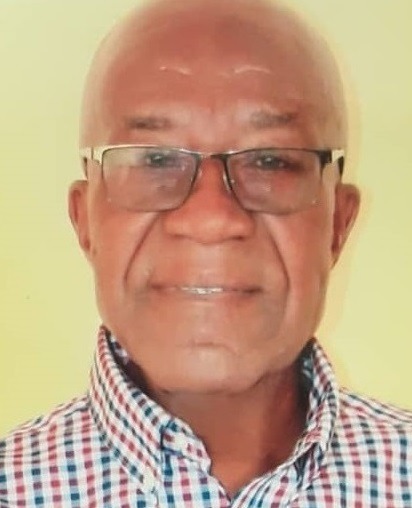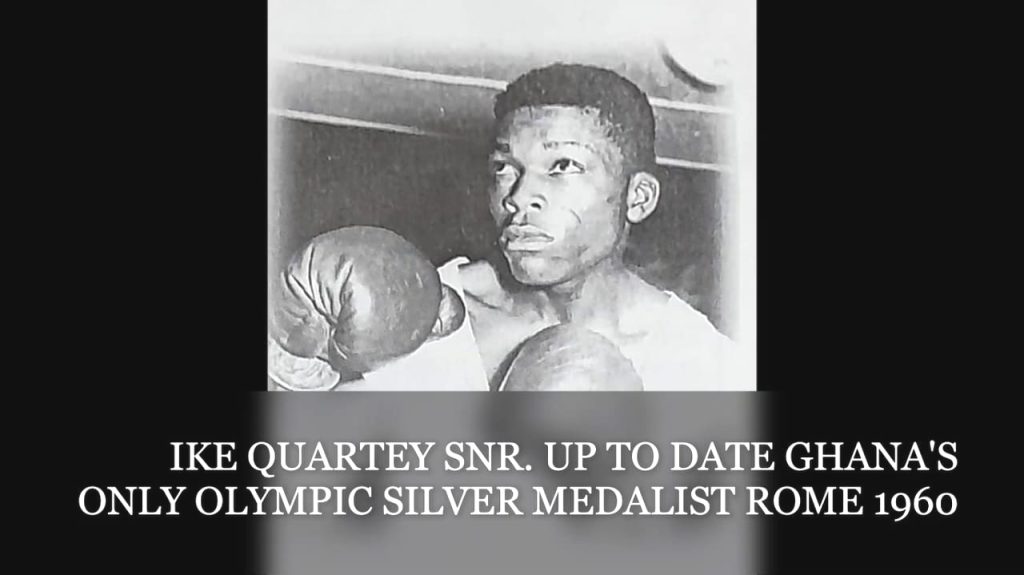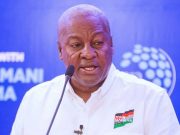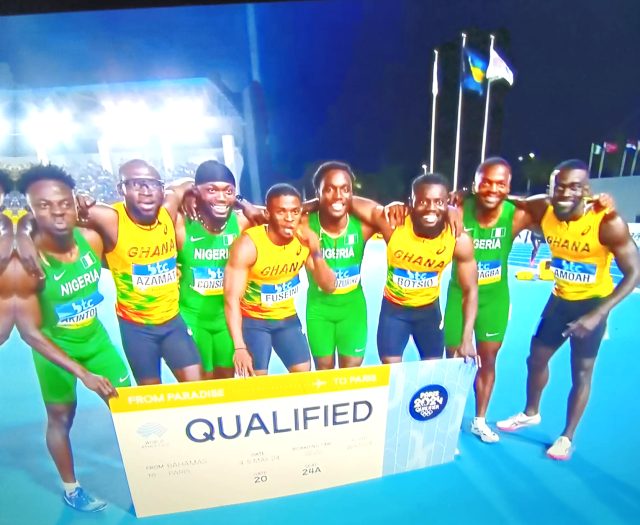By Ken Bediako
The spectacular qualification of Ghana’s men athletics sprints relay quartet for the upcoming Paris Olympic Games, has motivated me to write the history of Ghana and the Olympic Games dating back to the debut in1952 Helsinki Games. Bright Azemati, Joe Paul Amoah, Ibrahim Fuseini and Isaac Botsio have gallantly stepped in the big shoes of the past heroes and they deserve adulation. These young men are frantically continuing the proud tradition of Ghana’s past powerful quartets like B.K. Mends, Bukari Bashiru, M.F Okantey, Mike Ahey then E. C. O Addy, B.K. Mends, J.A. Addy, Stan Allotey of the 1960s and the 70s of George Daniels, Ohene Karikari, Albert Lomotey, K.O. Okyir again Ohene Karikari, George Enchill, Albert Lomotey, Ernest Obeng, the 80s of Myles Mills, Eric Akogyeram Emmanuel Tuffuor, Nelson Boateng, etc, etc. It’s a long list of dedicated athletes and the handlers must be proud of their achievement. As a friend of mine put it “tradition has not lost its bearings Kudos to Ghana athletics.”
At this juncture lets pause to refresh our memories with the history of the Olympic Games before I narrate the Ghana story.

The original Olympic Games were founded in 776BC and according to tradition were held at Olympia every four years without a single break until at least AD 261.
The modern Olympic Games were started in 1896 in Athens by a French man Pierre de Baron Coubertin who was born in Paris on 1st January 1863.
Though an elitist, Coubertin was not a wholly French aristocrat of his time. He foresaw a day when young men from the lower class might share his new ideology of physical exercise and Games. He had a strong belief that a revived Olympic festival will further the cause of international understanding, brotherhood and peace.
By 1894 Coubertin had made sufficient progress in his plans to revive the Olympics and he summoned an international conference in Paris and the Sorbonne to study and propagate the principles of amateurism.
He then set off for Greece and in October of that year he visited Olympia for the first time in his life. Two years later in 1896, the first modern Olympic Games were held in Athens.
Practical considerations of access and facilities for both athletes and spectators ruled Olympia out. Athens provided a new stadium with a seating capacity of 50,000. There were 42 events in ten sports disciplines with 285 participants all men and without team competitions except in gymnastics
The four-year interval was decided by the founder mainly in remembrance of the Asian Games that observed this regular cycle. He also rightly predicted the huge expenses and difficulties involved in organising such a worldwide festival
In 1952 Ghana (then Gold Coast) made her Olympic Games debut with a token team of six athletes in Helsinki, Finland.
The athletes were sprinters G. S Laryea, G. Acquah, A O. Lawson and J.K. Owusu.
J.T. Owuo high jump and W. Laing triple jump.
Laryea and Acquah did the 100 metres and partnered Lawson and J.K. Owusu for the sprints relay but could not survive the preliminaries.

Owuo cleared 1.80 m in the high jump to place 23rd
Ghana did not take part in the 1956 Melbourne Olympics in Australia but bounced back into action in the 1960 Games in Rome, winning her first Olympic medal.
This was courtesy boxer Ike Quartey Snr who won silver in the Lightwelterweight division.
In the final Ike was outpointed by Eohimil Nemetea of Czechoslovakia. Ike gave such a plucky display that most ringsiders thought he deserved the gold.
Top sports journalist Donald Sanders writing in the British Paper Daily Telegraph, said a large section of the vast crowd which occupied everyone of the 15,000 seat at the Palazo Delo spot clearly thought Ike had done enough to win.
Team manager Jack Roy said “I thought Ike had won. He was landing more punches with knuckle part of the glove. If the judges carry on like this, they will turn boxing into a sport for street fighters.”
Coach Roy Ankrah said “if they want street fighters here the Ghana boys can give it to them because so many of them fight just for the love of it.”
On his way to the final, Ike outpointed the awkward Moroccan opponent Mohammed Boubakar defeated Khalid Kakhi of Iraq in a tough duelling encounter and outclassed Kim Duck of Korea to reach the medal zone. Ike reached the final when he had walkover Poland’s Manain Kasprzyk. The Pole was unable to fight because of an eye injury sustained during his victory over Russian Olympic champion Vladimir Engibaryan.
The five other Ghanaian Boxers Cassis Aryee, Joshua Wilson Eddie Blay, Joseph Lartey and Alhassan Brimah could not survive the preliminaries.
Bantamweight Joshua Wilson turned out to be too heavy for the bantamweight and had to moved up to the featherweight division. In that case featherweight Eddie Blay had to move up to lightweight class. Eddie Blay won his first fight against Gualberts Gultierrez of Uruguay but lost the next fight against Dick Mctaggart of Scotland. Dick dominated the bout keeping Blay at bay with his copybook right. Blay tried to battle his way through Dicks guard and earned a warning from the referee for using his head Welterweight Joseph Lartey won his first fight against Lar Bergntrom of Sweden but lost the next encounter.
Featherweight Joshua Wilson was outpointed by Constantine Ghergie of Romania, Bantamweight Cassis Aryee lost to Japanese University student Krysochi Tonaba. The referee stopped the bout several times to warn Aryee for leaning on his opponent and this cost him points.
Middleweight Alhassan Brimah was knocked out in I min 55 secs of the first round by Boris Lagutin of the Soviet Union.
In track and field Gustav Ntiforo 100m J.A. Antwi 400m and F.A. Owusu 800m dropped out in the heats.
Gustav Ntiforo finished 4th in the 100m heats in 11secs; M. F Okantey survived the 200m 4th heats in 21.8 secs and Police Cpl F.A. Owusu placed 5th in the 800m first heats in 1min 55.2 secs
The 4x400m relay quartet of William Quartey, J.A. Addy, F.A. Owusu, J.A. Antwi clocked 3 min 10,5secs to place second to the USA in the 4th heats before dropping out at the next stage.
Bob Kotei placed 10th in the high jump with 6ft 7,8in. Generally, a fairly good performance by Ghana at her second Olympiad.
Next episode is Ghana at Tokyo 1964 and Mexico 1968.
Cheers everybody and keep loving sports.







































